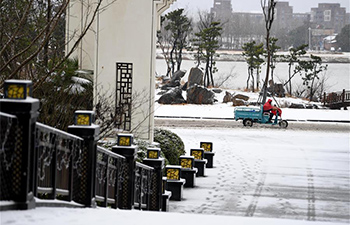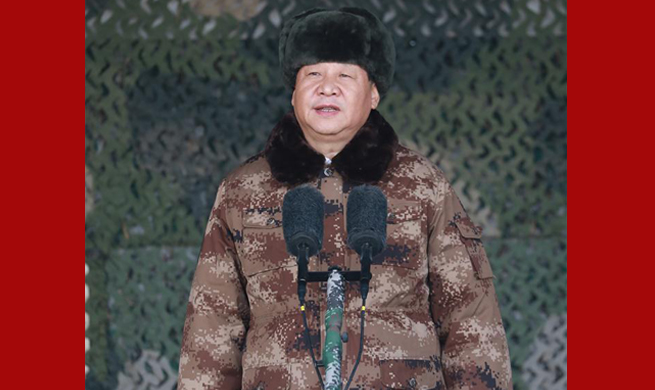FUZHOU, Jan. 4 (Xinhua) -- Chen Maozhe owns a garment dyeing factory. As the new year began, he wasted no time buying equipment that will substantially reduce waste water discharge.
Chen runs Fujian Futian Textile Printing and Dyeing Company in east China's Fujian province. Every year, close to 20,000 tonnes of textiles are dyed at his factory, which employs 300 workers. The new equipment will cost Chen almost a year's profits, but can reduce waste water discharge by 40 percent, he said.
"Starting this year, reduced emissions will be turned into tax breaks, so now is a good time for companies like us to revamp production technology and cut emissions," he said.
Starting Jan. 1, 2018, China started collecting a new type of tax -- the environment protection tax -- aimed at protecting the environment and cutting pollutant discharge.
Companies and public institutions that discharge listed pollutants directly into the environment will pay taxes for producing noise, air and water pollutants as well as solid waste.
"The new tax will benefit companies that have been committed to cutting emissions and saving energy. It will spur the companies to turn green," said Liu Jianmin, director of the local taxation bureau at Jinjiang City in Fujian.
In preparation for tax collection, taxation and environmental protection departments have established a database of companies eligible for the tax.
"Those that discharge more will pay more, and those that discharge little will pay little," said Cai Zili, an official with the State Administration of Taxation.
Tax rates are higher for pollutants that are more hazardous, Cai said. For example, the tax rate for formaldehyde is about 24 times that for smoke and dust.
According to the law, local governments will keep the tax revenue and will have the right to set tax rates. Regions that are under heavy environmental pressure, such as Beijing, Hebei and Tianjin, have adopted higher rates than others, said Cai.
"The environment protection tax is an important step to build a green taxation system in China. It is not a mere source of government revenue -- it has larger social implications," said Cai.
The introduction of the tax called an end to the "pollutant discharge fee," which China had been collecting for nearly 40 years.
On a quarterly basis, taxation and environmental protection authorities will keep track of the emissions of the companies. Those whose emissions are down may apply for tax redemption.
Despite enormous efforts in environmental protection, air, water and soil quality still need to be improved in many Chinese cities.
China has joined the Paris Agreement, aimed at tackling climate change and promising to cut emissions.
Liu Shangxi, head of the Chinese Academy of Fiscal Sciences, said the new environment tax seizes upon where the money is and will help China reduce emissions of key pollutants.
"The tax will be part of the government's package to clean up the environment and achieve green development," Liu said.
Tackling pollution has been listed as one of the "three tough battles" that China aims to win in the next three years, according to the Central Economic Work Conference held at the end of last year.
"From implementing the new environmental protection law to dispatching central inspectors to check pollution, and now collecting the tax, China has quickened its steps in environmental protection," said Zhang Zitai, a law professor in Fudan University.
Zhang said there has been a high level of consensus between the government and the public in this regard. "It is paving the way for a green future."

















